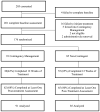Randomized controlled trial of contingency management for stimulant use in community mental health patients with serious mental illness
- PMID: 23138961
- PMCID: PMC4242089
- DOI: 10.1176/appi.ajp.2012.11121831
Randomized controlled trial of contingency management for stimulant use in community mental health patients with serious mental illness
Abstract
Objective: The primary objective of this study was to determine whether contingency management was associated with increased abstinence from stimulant drug use in stimulant-dependent patients with serious mental illness treated in a community mental health center. Secondary objectives were to determine whether contingency management was associated with reductions in use of other substances, psychiatric symptoms, HIV risk behavior, and inpatient service utilization.
Method: A randomized controlled design was used to compare outcomes of 176 outpatients with serious mental illness and stimulant dependence. Participants were randomly assigned to receive 3 months of contingency management for stimulant abstinence plus treatment as usual or treatment as usual with reinforcement for study participation only. Urine drug tests and self report, clinician-report, and service utilization outcomes were assessed during the 3-month treatment period and the 3-month follow-up period.
Results: Although participants in the contingency management condition were significantly less likely to complete the treatment period than those assigned to the control condition (42% compared with 65%), they were 2.4 times (95% CI=1.9–3.0)more likely to submit a stimulant-negative urine test during treatment. Compared with participants in the control condition,they had significantly lower levels of alcohol use, injection drug use, and psychiatric symptoms and were one-fifth as likely as those assigned to the control condition to be admitted for psychiatric hospitalization during treatment. They also reported significantly fewer days of stimulant drug use during the 3-month follow-up.
Conclusions: When added to treatment as usual, contingency management is associated with large reductions in stimulant,injection drug, and alcohol use.Reductions in psychiatric symptoms and hospitalizations are important secondary benefits.
Trial registration: ClinicalTrials.gov NCT00809770.
Figures


Comment in
-
Contingency management for patients with serious mental illness and stimulant dependence.Am J Psychiatry. 2013 Jan;170(1):6-8. doi: 10.1176/appi.ajp.2012.12101324. Am J Psychiatry. 2013. PMID: 23288383 No abstract available.
References
-
- Regier DA, Farmer ME, Rae DS, Locke BZ, Keith SJ, Judd LJ, Goodwin FK. Comorbidity of mental disorders with alcohol and other drug abuse: Results from the Epidemiologic Catchment Area (ECA) study. Journal of the American Medical Association. 1990;264:2511–8. - PubMed
-
- RachBeisel J, Scott J, Dixon L. Co-occurring severe mental illness and substance use disorders: a review of recent research. Psychiatr Serv. 1999;50(11):1427–34. - PubMed
-
- Bennett ME, Bellack AS, Gearon JS. Treating substance abuse in schizophrenia. An initial report. J Subst Abuse Treat. 2001;20(2):163–75. - PubMed
-
- Galanter M, Dermatis H, Egelko S, De Leon G. Homelessness and mental illness in a professional- and peer-led cocaine treatment clinic. Psychiatr Serv. 1998;49(4):533–5. - PubMed
-
- Haywood TW, Kravitz HM, Grossman LS, Cavanaugh JL, Jr, Davis JM, Lewis DA. Predicting the “revolving door” phenomenon among patients with schizophrenic, schizoaffective, and affective disorders. Am J Psychiatry. 1995;152(6):856–61. - PubMed
Publication types
MeSH terms
Substances
Associated data
Grants and funding
LinkOut - more resources
Full Text Sources
Other Literature Sources
Medical

